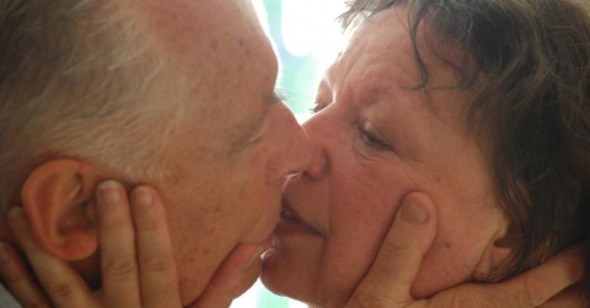The New Age
by Michael Koresky
Cloud 9
Dir. Andreas Dresen, Germany, Music Box Films
Cloud 9 makes a spectacle of the very thing it intends to demystify. Namely: geriatric sex, which the film seeks to make mundane by refusing to shy away from the sight of its elderly principals engaged in graphic simulated rutting. Yet by foregrounding the carnality and the naked bodies of its sixty- and seventy-something actors, and by extension the implicit “courage” of its choices, Cloud 9 risks trivializing and objectifying its protagonists. This is particularly detrimental to a film whose unremarkable central love triangle plot desperately needs vital characters to make any impact; rather than the drama of vividly realized people, German director Andreas Dresen’s romance trades in flesh, as well as elevated notions of itself.
It’s a film that feels less lived-in than overly studied, despite the director’s stated aspirations to Mike Leigh–style character investment and improvisation. Dresen’s rehearsal process with Ursula Werner, as 67-year-old Inge, Horst Rehlberg, as her stoic husband of 30 years, and Horst Westphal, as her 76-year-old lover, has resulted in little more than alternating histrionic breakdowns and polite domestic rapport compressed into a mise-en-scène dully beholden to contemporary European art-house filmmaking style: toggled handheld and static camera, grainy authenticity, harsh natural light. Cloud 9 doesn’t show us anything new so much as it use its characters’ age as a gimmick to gussy up its hoary clichés: call it shabby chic.
Uncharitable though this may all sound towards a late-in-life affair tale that means to nobly assert the vibrancy of elderly sexuality, its good intentions pale in comparison to the unconvincing result. Seamstress Inge, After discovering untapped inner passions with her customer Karl during an unexpected afternoon tryst in his apartment upon delivering a pair of pants, finds herself questioning her comfortable but nondynamic relationship with Werner. The inciting act may indeed be represented in a way one could, and many will, describe as “raw” or “refreshingly frank”—caressing of each other’s faces leads to kissing and then naked fumbling and thrusting on his sun-drenched apartment floor—but the resultant overwrought dramatics, from Inge’s tortured self-punishments to her blissful outdoorsy interludes with Karl, feel anything but genuine.
Bloated and slightly amphibious, like Fassbinder’s oft used Brigitte Mira, Ursula Werner plays Inge as a sympathetic sad sack, given to unpredictable mood swings, one minute basking in the glory of newfound eroticism, and the next wailing at the difficulty of making such life-altering choices in her golden years. It’s a performance that will certainly gain accolades (and already has won her the German Film Award for best actress), and Werner does indeed lay herself out willingly for the audience—it’s both an interior and exterior feat. Yet Dresen’s treatment of her is consistently unflattering: whether his camera lingers on her as she wails in bed like a stricken animal, stares at her sagging nakedness in a full-length mirror, or, in perhaps the film’s most gratuitous moment, masturbates in the tub, he makes her an object more than a fully rounded wife, mother, or lover. This is not to infer that the men in the film don’t get equally exposed, often undressing at awkward moments meant to project domestic intimacy but which rather seem only to serve the purpose of its director’s “brave” vision—certainly it makes sense for Karl’s body to be on display during his passionate trysts with Inge, but by the time Inge’s husband Werner begins shuffling around his house and work room unclothed, the film begins to feel more agenda-driven. Last year, Jacques Nolot’s Before I Forget similarly used the nude corporeality of its protagonist, an aging hustler, as a focal point, but that film’s rigorous philosophical examination of the body as a site of capital and ultimate betrayal justified its objectifying approach.
Of course there’s more to the film than naked old flesh, yet it might have been easier to not fixate solely on this if any of Dresen’s other sequences hadn’t seemed like merely plot-point hits—in fact, the scenes of the lovers skinny-dipping, bicycling, running through the rain, making out in a storm-buffeted car, and staring at quivering tree branches might have come out of any perfunctory romance. And Werner and Karl are by design fairly textbook compare-and-contrast figures: staid Werner likes to ride trains and look at the world moving by from behind glass windows, while earthy Karl declares “I prefer nature”; Karl and Inge laugh at a dirty joke about 80-year-olds having sex, but when she repeats the punchline to Werner at the kitchen table (camera politely perched in the next room) he stuffily stares ahead as she guffaws uncontrollably.
Such broad strokes don’t make her liberation uncomplicated exactly, but neither do they convince that we’re watching anything but types. The film’s final moments certainly paint Inge’s final decisions as complex and questionable, but Cloud 9 remains a surprisingly superficial portrait of marriage, in which the filmmaker’s self-conscious dauntlessness trumps any possible truth-finding. Physical rawness doesn’t grant immediate authenticity: take as example Leo McCarey’s sublime 1937 Hollywood hokum Make Way for Tomorrow, with its middle-aged actors dolled up in elderly makeup and traversing soundstages. It’s a film whose artificiality can barely mask its genuine emotion, and it manages to say more about the difficulties of lifelong commitment than this supposedly vérité look at people on the verge.
